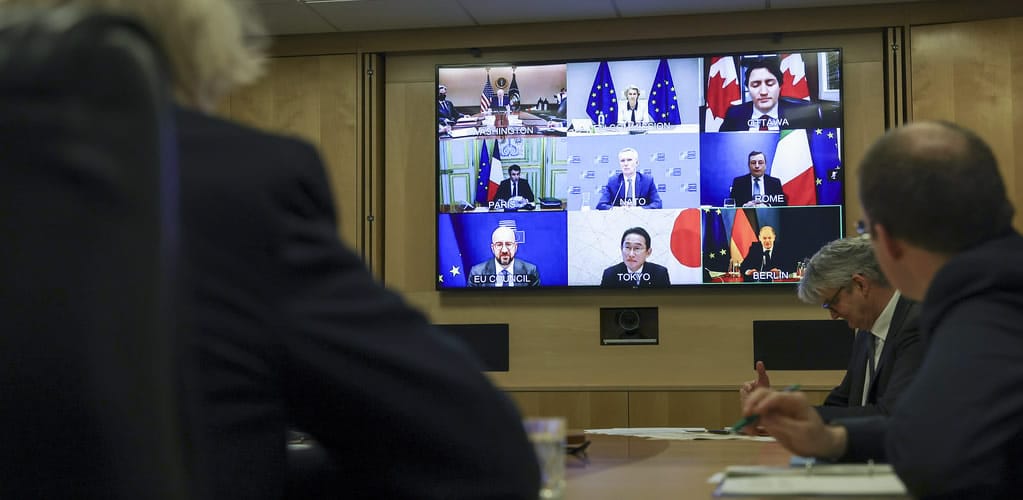Sanctions can still make a difference – but only if done right.
Economic warfare only works if it really hurts. If Putin’s inner circle and the Russian elite begin to see that their financial and political futures are better secured without conflict, they might seek to abandon it or try to negotiate their own defections.

Economic warfare only works if it really hurts. If Putin’s inner circle and the Russian elite begin to see that their financial and political futures are better secured without conflict, they might seek to abandon it or try to negotiate their own defections.
First published: February 2022.
The aim of economic sanctions against Russia is to limit Vladimir Putin’s power, damage morale, and exert serious political pressure. So far, the tactic has not worked. Ukraine has been invaded. The missiles have been launched.
International leaders now need to ask themselves urgent questions about how much financial pain they can inflict on Russia, and how much impact they can realistically expect this to have. None of the answers are simple.
Effective sanctions would need to directly affect Putin himself, his closest officials and his political supporters. They would also have to be noticed by the Russian population, reducing Putin’s popularity and, in effect, opening up a domestic front in the conflict.
But targeting individual citizens of a specific nation is a complex task for an international economic system which is far more entangled than it used to be. For while the former USSR had relatively little exposure to western economies, modern Russia has become completely enmeshed in global financial and trading systems. Within these systems there exists great financial and legal expertise designed to reduce exposure and protect the fortunes of the wealthy.
Still, there are options available to the west, including bans on trading and the seizure of assets.
For the UK government especially, there are opportunities to do this on home soil. Over the last three decades, London has become a welcoming new home for large quantities of Russian money, with its hyper-inflated property market turning billions of roubles into bricks and mortar.
Like what you are reading? Please, support our work today!
Support PMP MagazineThe UK’s financial services industry has also provided lucrative support and advice to very rich Russians. This means that any economic sanctions which effect inward Russian investment will dent the bottom line of some of the UK’s most successful firms.
Once in place, managing a sanctions regime is as important as the framing of the measures. Targeting named individuals but not their personal and professional associates, for example, is to invite workarounds and avoidance which should be closely monitored. So too should attempts by those placed under sanctions to move and protect their wealth.
Fund management
In the UK, the successful policing of sanctions will require greater funding for the City of London Police (who investigate financial crime), the Serious Fraud Office, the National Crime Agency and the Inland Revenue.
The firms that have benefited from advising on Russian wealth and setting up complex corporate structures are an important element in the investigatory mix too. At a time of conflict, it will be important for them to make clear where their support lies.
In the world of counterinsurgency, it is often said that an enemy stops fighting when the costs outweigh the perceived benefits of continuing. This is likely to be the case in Ukraine.
If Putin’s inner circle and members of the wider Russian elite begin to see that their financial and political futures are better secured without conflict, logic suggests they might reconsider their position. Some of them might even seek to abandon the project or try to negotiate their own defections, as happened during the cold war.
The sanctions initially announced by the UK were relatively limited. Many of the individuals involved had been sanctioned previously and preventing a limited number of Russian banks from raising debts or using clearing services would merely cause the Russian military to use alternative financial institutions.
But hours after the full-scale invasion of Ukraine, the British prime minister Boris Johnson said the UK and its allies would be launching a “massive package” of sanctions designed to “hobble” Russia’s economy.
These measures amounted to a far stronger stance. The range of Putin associates covered by the sanctions is wide, but their families and associates were not named, leaving sizeable holes in the net.
The National Crime Agency is to receive additional resources and support for its efforts to hunt down laundered money, which is a significant help; as is bringing forward further transparency legislation to reveal who actually owns particular types of assets.
No billionaire owner. No wealthy shareholders. PMP Magazine only exists thanks to donations from our readers.
Support our independent journalismSeizing those assets – property, funds, yachts – from targeted individuals, their families and close associates, will hurt Putin’s wider circle and support structures. Similarly, preventing travel for the same people would disrupt their ability to do business and live the jet-set lives their families and entourages are accustomed to.
Going even further and enacting transparency rules to cover the ownership of land and property in the UK, and to make shell company structures visible would get much closer to the financial strength of the Russian elite.
These measures are the kind that would provide the kind of dissuasive force required to make the cost of war too great. And they are all entirely within the power of the British government.

What did you think of this article?
🤩 😀 🤔 😴 😮 😭 🤬 🤯
— AUTHOR —▫ Professor Robert M. Dover, Professor of Criminology, University of Hull. |
GET THEM INVOLVED: |
Sources
- Text: This piece was originally published in The Conversation and re-published in PMP Magazine on 25 February 2022. | The author writes in a personal capacity.
- Cover: Flickr/Number 10 – Simon Dawson. - PM Boris Johnson holding G7 Call on Ukraine. | 24 February 2022. (Licensed under a Creative Commons Attribution-ShareAlike 4.0 International License.)







[Read our Comments Guidelines]